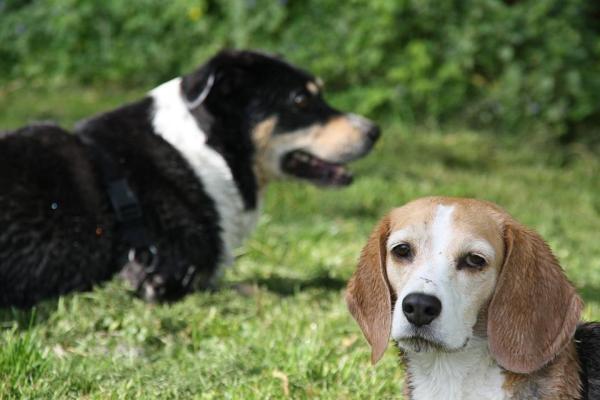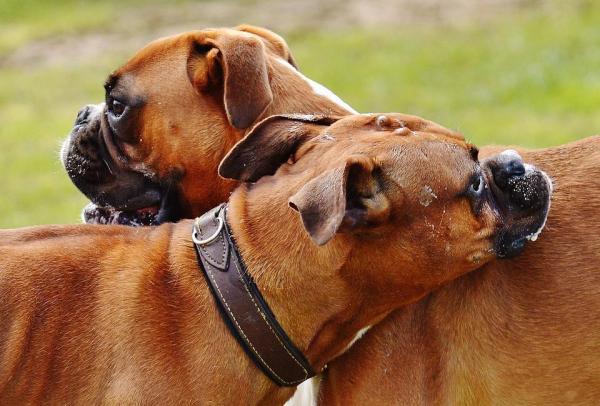What to Do When Two Dogs Don't Get Along



See files for Dogs
We usually think that dogs, being naturally sociable animals, are always going to get along well with other animals. For this very reason, many families decide to welcome another dog into the household.
Just like people, however, dogs can not get along with one another. When this happens, dogs living together can become a real headache for their owners, who don't know how to tackle the problem.
In this post we will give you the necessary tips to keep two or more dogs at home and make sure they get on well. Keep reading this AnimalWised article to know what to do when two dogs don't get along.
Introducing two dogs to each other
Increasing the size of the family by adopting another pet can be very positive when your dog spends a lot of time alone, but it is important to do so correctly to prevent compatibility problems between the two dogs.
Dogs are very territorial animals, meaning there may be aggression problems if they feel that a new animal is invading their space; they may even try to attack the other dog. Most of the time, owners don't know what to do when two dogs don't get along at home.
It is essential to prevent this by making sure that they first get to know each other in a neutral territory such as the park, before you bring your new tenant home.
It might be the case that the two dogs get on great from the start, or that you spot there is bad blood between them, for instance if they growl or challenge each other. In these cases, it is advisable to start taking them for walks together so that they get used to teach other's company in a relaxed atmosphere before they start living together.

How should you act at home?
Dogs consider their home as a territory they need to defend, so they can get aggressive when another animal enters. It's very important to know what to do when two dogs don't get along to prevent more serious problems.
One of the most important issues is training them properly. As the owner, you are responsible for getting your pets to respond to your orders and obey the rules of the house. This is a very important step when it comes to introducing a new member into the family. If the two dogs don't get along you can start teaching orders to the new dog separately and gradually begin teaching them together as the training progresses.
By doing this, you can teach each animal to respect the space and possessions of the other. Each dog will have its own bed, food bowl and toys - especially at the start - which is why there will be fewer problems with possessiveness and jealousy.
The roles should be well marked: You are the leader of the pack and the dogs need to know it. Nonetheless, remember that violence leads to more violence, and you should never reprimand your dogs by hitting them or shouting at them aggressively. This is not only animal abuse, but can actually make your dogs more aggressive and cause them to fight more between each other - and perhaps even attack you. You can make your dogs respect you by using different training methods like positive reinforcement, rewarding good behaviors instead of punishing bad ones.
There is also hierarchy among the animals. Dogs may growl or challenge each other after the introduction of a new member to the family unless one of the two dogs is clearly submissive. This is a normal attitude and there is no need to worry.
Dogs sometimes fight for the affection of the owner, so you should avoid showing more affection to one than the other. At the same time, you should show the veteran of the house that nothing has changed despite the arrival of a new friend.

What to do when two dogs get along very badly?
If you have followed our advice but still feel that you can't control your dogs and you don't know what to do if your two dogs get along very badly, it will be best to consult a canine ethologist, who will analyse the situation and help you find a solution to the problem.
As we explained, growling and small feuds are common among dogs. However, serious fights and situations which you cannot control require the visit of a professional who will guide you with appropriate guidelines and tips for your particular case. The ethologist will help you by evaluating your daily routine - including walks, exercise and other aspects - the welfare of both dogs and the possible causes of the problem.
Do you have more than one dog at home? How do they get on? How did the introduction of a new family member go down? Tell us in the comments.

If you want to read similar articles to What to Do When Two Dogs Don't Get Along, we recommend you visit our Behavioral problems category.







 I have 3 dogs, all male. 5 year old shepherd mix, 4 year old Rottweiler and a 3 year old Pitbull. The pit was about 6 months old when we found him and introduced him to the other 2 dogs. Everything was great until the pit turned 1 1/2 then he and my Rottie got into a few bad fights where I even got injured.
I have 3 dogs, all male. 5 year old shepherd mix, 4 year old Rottweiler and a 3 year old Pitbull. The pit was about 6 months old when we found him and introduced him to the other 2 dogs. Everything was great until the pit turned 1 1/2 then he and my Rottie got into a few bad fights where I even got injured.


